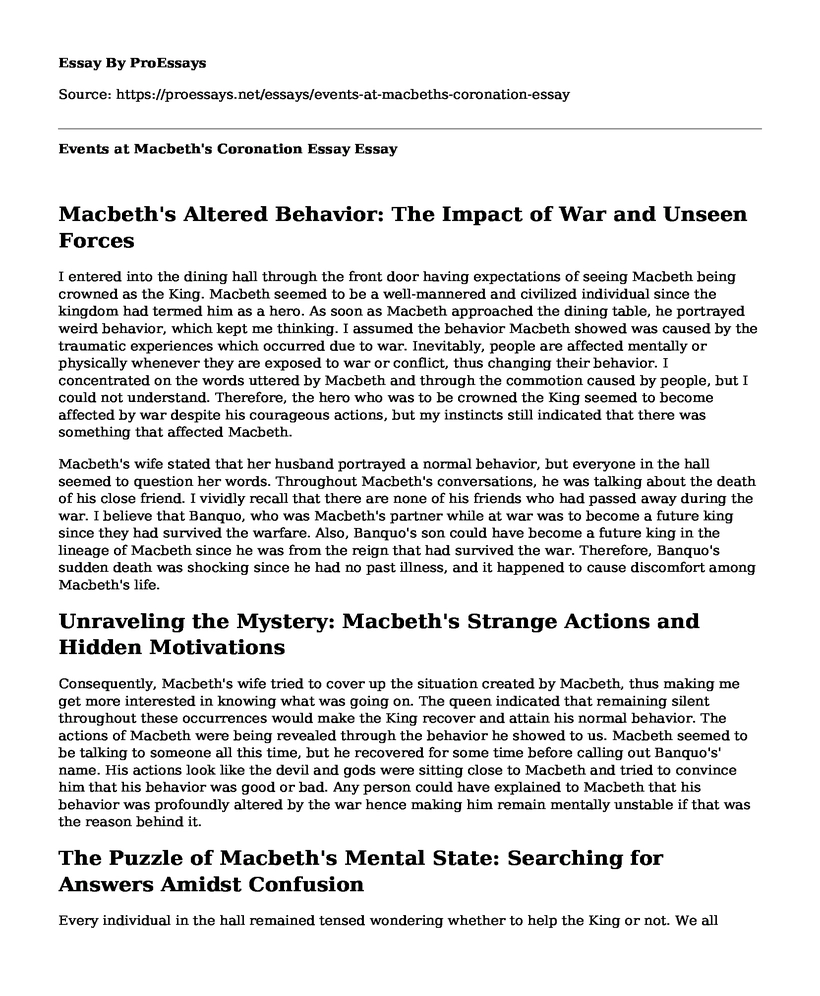Macbeth's Altered Behavior: The Impact of War and Unseen Forces
I entered into the dining hall through the front door having expectations of seeing Macbeth being crowned as the King. Macbeth seemed to be a well-mannered and civilized individual since the kingdom had termed him as a hero. As soon as Macbeth approached the dining table, he portrayed weird behavior, which kept me thinking. I assumed the behavior Macbeth showed was caused by the traumatic experiences which occurred due to war. Inevitably, people are affected mentally or physically whenever they are exposed to war or conflict, thus changing their behavior. I concentrated on the words uttered by Macbeth and through the commotion caused by people, but I could not understand. Therefore, the hero who was to be crowned the King seemed to become affected by war despite his courageous actions, but my instincts still indicated that there was something that affected Macbeth.
Macbeth's wife stated that her husband portrayed a normal behavior, but everyone in the hall seemed to question her words. Throughout Macbeth's conversations, he was talking about the death of his close friend. I vividly recall that there are none of his friends who had passed away during the war. I believe that Banquo, who was Macbeth's partner while at war was to become a future king since they had survived the warfare. Also, Banquo's son could have become a future king in the lineage of Macbeth since he was from the reign that had survived the war. Therefore, Banquo's sudden death was shocking since he had no past illness, and it happened to cause discomfort among Macbeth's life.
Unraveling the Mystery: Macbeth's Strange Actions and Hidden Motivations
Consequently, Macbeth's wife tried to cover up the situation created by Macbeth, thus making me get more interested in knowing what was going on. The queen indicated that remaining silent throughout these occurrences would make the King recover and attain his normal behavior. The actions of Macbeth were being revealed through the behavior he showed to us. Macbeth seemed to be talking to someone all this time, but he recovered for some time before calling out Banquo's' name. His actions look like the devil and gods were sitting close to Macbeth and tried to convince him that his behavior was good or bad. Any person could have explained to Macbeth that his behavior was profoundly altered by the war hence making him remain mentally unstable if that was the reason behind it.
The Puzzle of Macbeth's Mental State: Searching for Answers Amidst Confusion
Every individual in the hall remained tensed wondering whether to help the King or not. We all wondered how the war could have affected Macbeths' state of mind. Macbeth's wife seemed confused and nervous as if she was hiding some information from us concerning the whole issue. I kept wondering what had contributed to such a psychological illness, but no one was around to provide a legit answer. Also, some guards in the hall looked confused and terrified as if they had a hint of whatever was going on in Macbeth's life. Was there any other thing that troubled the King apart from the war since the effects seemed to be more as if he had hallucinations? All these actions kept me thinking and wanting to know more, and if I could be of any help to Macbeth's family. Macbeth and his wife left the room, thus leaving everyone in a state of confusion without knowing the reality behind Macbeth's story.
Cite this page
Events at Macbeth's Coronation Essay. (2022, Feb 22). Retrieved from https://proessays.net/essays/events-at-macbeths-coronation-essay
If you are the original author of this essay and no longer wish to have it published on the ProEssays website, please click below to request its removal:
- Questions and Answers About Woman of Colour
- Essay on Comparing Two Translations of Heine's Poem
- Thorwald and Nora Helmer's Attitudes Toward Money - Essay Sample
- Literary Analysis Essay on Wife of Bath's Prologue and Wife of Bath's Tale by Geoffrey Chaucer
- Critical Essay on Gender Equality in Brave New World
- King Lear by William Shakespeare Essay Example
- The Varied Mythology of Ancient Egypt: 4000 BCE - Essay Sample







